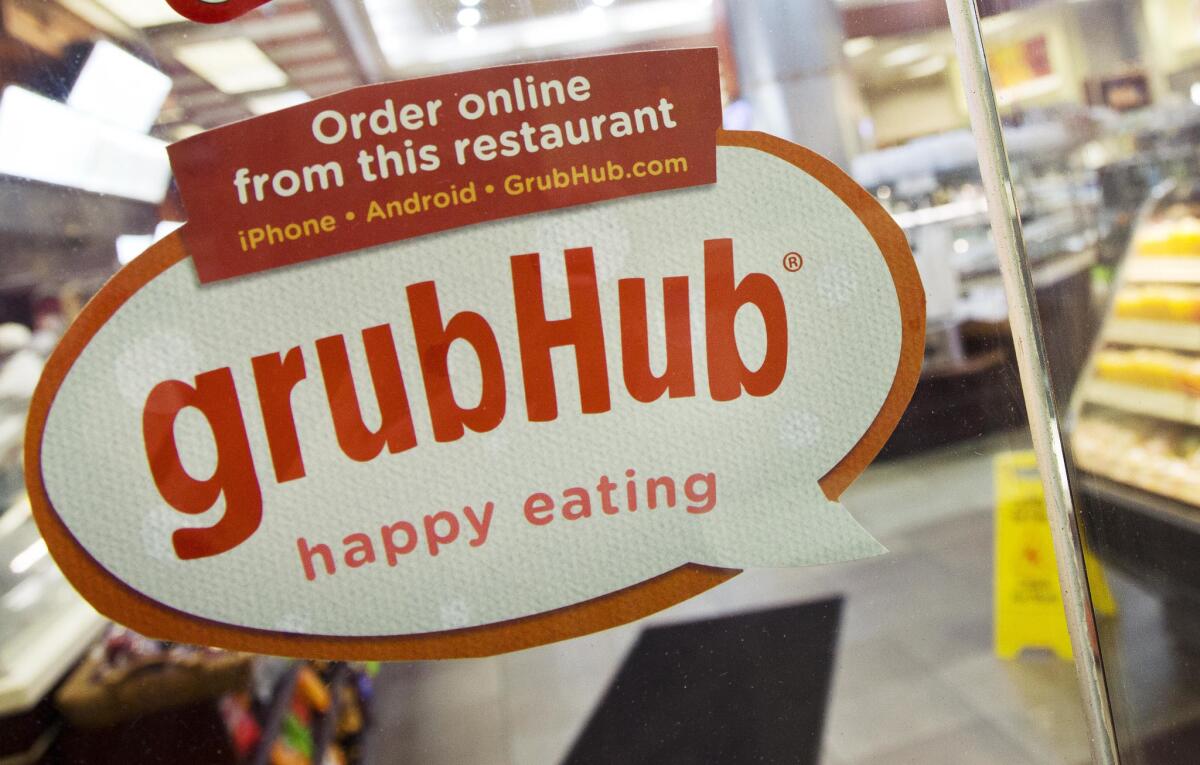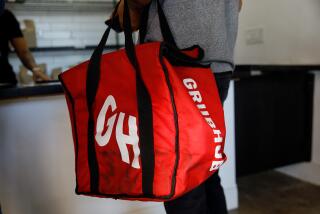Uber offers to buy Grubhub, plans to sell $900 million in bonds

Uber Technologies Inc. has made an offer to acquire Grubhub Inc., a move that could combine two of the largest food-delivery apps in the U.S. as the novel coronavirus — and the stay-at-home orders meant to limit the virus’ spread — drives a surge in demand, according to people familiar with the matter.
The companies are in talks about a deal and could reach an agreement as soon as this month, said the people, who asked not to be identified because the matter isn’t public. Deliberations are ongoing, and talks could still fall through, the people said.
Although neither company confirmed the talks, they both said they’re always looking for opportunities to provide value to their businesses.
On Wednesday, Uber brought a $900-million bond sale. That’s up from a planned $750-million sale, which the company said may be used for acquisitions, among other general corporate purposes. The five-year notes, which can’t be bought back for two years, will yield 7.5%, said people with knowledge of the matter, who asked not to be named discussing a private transaction.
S&P Global Ratings grades Uber’s new unsecured notes as CCC+, or seven levels below investment grade. Moody’s Investors Service rates them B3, one step higher than S&P.
Grubhub, founded in 2004, is the oldest of the major food delivery companies in the United States. In recent years, competition from DoorDash Inc. and Uber has squeezed Grubhub’s profit margins. The pandemic is adding more pressure, forcing Grubhub to withdraw its 2020 financial guidance last month. Uber pulled its forecast too, and said a plan to turn a quarterly adjusted profit this year would be delayed until 2021.
As part of a series of cost-cutting movies, Uber said last week that it is ending its food-delivery operations in seven countries where the service has proved unpopular. Those markets represented 1% of Uber Eats’ gross bookings and 4% of the business’ adjusted loss before interest, taxes and other expenses for the first quarter of 2020, the company said. Uber’s ride-hailing business has been hammered by the global pandemic, but in the U.S. and other developed markets, delivering meals has helped the San Francisco company drive sales as people mostly stay at home.
Food delivery remains largely unprofitable. That dynamic has led to much speculation about potential consolidation in the industry. DoorDash, which is privately held and backed by SoftBank Group Corp., is the most popular in the U.S., followed by Grubhub and Uber. Any merger between the major apps could draw antitrust scrutiny. Together, Uber and Grubhub could account for 55% of the market, according to Wedbush Securities.
A deal “would help consolidate the U.S. online food delivery market and reduce cash burn,” Bloomberg Intelligence senior industry analyst Mandeep Singh wrote in a note Tuesday.
Meanwhile, these companies face calls from officials to improve conditions for their gig economy workers. California’s attorney general sued Uber and ride-hailing rival Lyft Inc. last week, alleging they’re in violation of a state law designed to give their workers the benefits due to employees. A loss in that case could set a precedent that increases costs for the companies and raises further questions about their ability to be profitable.
Rep. David Cicilline (D-R.I.), who heads the House antitrust subcommittee, said the proposed deal underscores the urgency for a moratorium on most mergers, an idea supported by other Democrats. “Uber is a notoriously predatory company that has long denied its drivers a living wage. Its attempt to acquire Grubhub — which has a history of exploiting local restaurants through deceptive tactics and extortionate fees — marks a new low in pandemic profiteering,” Cicilline said in a statement.
Restaurant advocates also said they were worried about the potential consequences of an Uber-Grubhub combination. “It’s extremely concerning,” said Andrew Rigie, executive director of the NYC Hospitality Alliance, a group that represents restaurants in New York. Grubhub and its Seamless division already dominate the city, Rigie said, “and they use their leverage and market share at the expense of local restaurants.”
Bradley Tusk, an early Uber advisor who has since sold his stake in the company, said that if the policies cities are considering take hold long term, “it may be that consolidation is the only way to have a couple of market players that can survive at all.” Otherwise, food delivery could end up looking like the costly ride-hailing rivalry between Uber and Lyft, Tusk said.
“Uber should have found a way to buy or kill Lyft a lot earlier,” Tusk said. “The unit economics of ride sharing would be a lot easier if they had, and I think they’re trying to learn that lesson now with the acquisition of Grubhub.”
Hammond, Smith and Newcomer write for Bloomberg.
More to Read
Inside the business of entertainment
The Wide Shot brings you news, analysis and insights on everything from streaming wars to production — and what it all means for the future.
You may occasionally receive promotional content from the Los Angeles Times.










